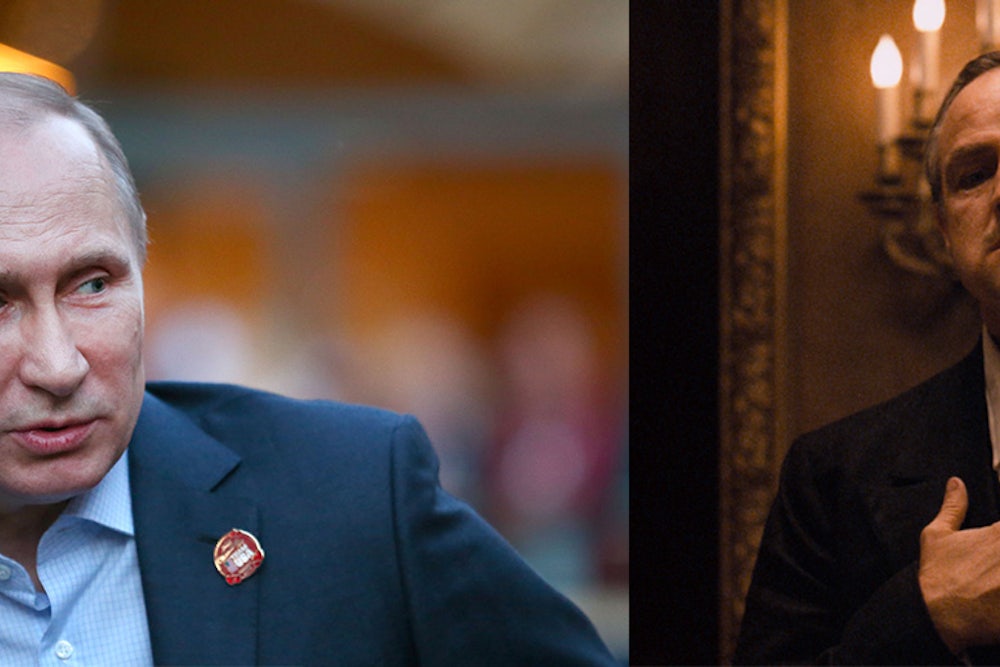In annexing Crimea, Vladimir Putin behaved like the Godfather. He gave Russia and the world an offer they couldn’t refuse and said: Either your brains or your signature will be on this contract. This policy proved effective, though it’s not clear for how long.
Earlier this week, Putin said what he thinks: that his regime feels brazenly impudent, and he will do whatever he feels like doing. Crimea is only the first step. He did not, however, say everything.
There was a whole host of lies and manipulations in every paragraph of his address, but lies and manipulation are also an intrinsic component of Putin’s thinking about the world. Any subtle analysis of the address is a waste of time. The president of Russia—so powerful and so isolated—entered a path of confrontation with the rest of the world. He invited partners to talks and then immediately announces that they are “brutal, irresponsible, and unprofessional.” There is something of the spirit of Dostoevsky’s Demons in this—it creates a world that does not exist and has never existed.
What does Kosovo—where Albanians were persecuted—have to do with the situation of the residents of Crimea, who have never been persecuted by anyone? What are we to make of the contempt for the Ukrainian government and parliament? What is it supposed to mean to refer to the Ukrainian government as “fascists and anti-Semites”? Crimean Tatars won’t believe these fairytales about fascists ruling Ukraine because they remember the brutal and murderous mass deportation of their nation by the Stalinist NKVD.
Putin points to the history of Russia being discriminated against by the whole world over the last three centuries. It is, indeed, difficult to imagine more painful discrimination that that from the time of Catherine II, Bloody Nicholas, or Joseph Stalin—the great linguist and liberator of peoples.
Putin also alarms Russians and Ukrainians that "we and you, Russians, and Ukrainians, might completely lose Crimea in the near future.” He does not specify, however, who—perhaps Poles and Lithuanians once again—is gearing up for the conquest of Sevastopol.
Putin claims: “We could not abandon Crimea and its residents in distress.” These words arouse a sad smile—they are a quote from Leonid Brezhnev, from his justification of the intervention in Czechoslovakia in August 1968.
Putin says: "We want Ukraine to be a strong, sovereign and self-sufficient country”—and this, in turn, is what Stalin said about Poland in 1945. I will not bring up Hitler’s words from the time of the Anschluss and the conquest of Czechoslovakia—my friends, the Russian democrats, have already done that.
History has come full circle. This is the true end of history—the history of dreams about a world ruled by democratic values and the market economy. If the democratic world fails to understand that there is no more room for traditional faith in diplomats’ compromises and that it is necessary to find an adequately forceful answer to halt Putin’s imperialist and criminal politics, a logic of events will be put into motion that is frightening to imagine. Only force can stop banditry.
I think about the policies of the Polish state and the attitudes of Polish society with respect and pride. The judiciousness and determination of Polish politics deserves a very high grade. We have to understand, however, that we are now witnessing the end of the best quarter century of Polish history in the last four centuries. A time of tectonic shocks has begun. Let us appreciate what we have achieved and now learn to guard it.
We know, by the way, that things ended badly for the Godfather—I do not foresee anything better for his Russian plagiarist.
Adam Michnik, a leader of the anti-Communist opposition in Poland in the 1970s and 1980s, is the editor-in-chief of Gazeta Wyborcza, where this piece originally appeared. Translated by Agnieszka Marczyk.
